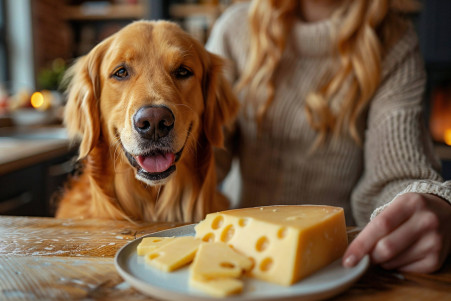Can Dogs Have Pepper Jack Cheese? A Vet Weighs In
13 June 2024 • Updated 13 June 2024

Whether you’re looking to enjoy a snack with your pup or you’re trying to make sure you’re not giving them any of your food, it’s important to know whether or not pepper jack cheese is safe for dogs. Pepper jack cheese is safe for dogs to eat in moderation. The cheese has some nutritional value, as it contains protein and calcium, which are good for a dog's diet. However, the spices used to make pepper jack cheese, like jalapeño and cayenne pepper, can cause gastrointestinal upset if consumed in large amounts.
While pepper jack cheese can be tasty for humans, it’s important to understand the potential dangers and safety measures when it comes to feeding dogs any kind of cheese. In order to provide the most comprehensive information, we referenced veterinary nutritionists for their expert opinions, cited dog breed recommendations, and looked at scientific studies that have investigated the effects of different human foods on dogs.
Can dogs eat pepper jack cheese?
Lactose Intolerance and Cheese Allergies in Dogs
Lactose intolerance is a common cause of digestive upset in dogs who eat cheese. According to PetMD, some dogs don’t have enough lactase enzymes to break down the lactose in milk and dairy products, resulting in symptoms like diarrhea, vomiting, and gas. Lactose intolerance can affect dogs to different degrees, and some breeds are more susceptible than others.
Puppies and senior dogs are more likely to be lactose intolerant because their digestive systems are still developing or have started to decline. In addition to lactose intolerance, the American Kennel Club notes that cheese is also high in fat and sodium, which can cause health issues like obesity and pancreatitis if dogs eat too much. This is especially true for breeds that are prone to pancreatitis, including schnauzers and cocker spaniels, according to Hill's Pet Nutrition.
If your dog is lactose intolerant or overweight, pet experts recommend feeding them low-fat cheeses like cottage cheese, mozzarella, and Swiss instead. However, it’s important to always monitor your dog’s reaction to new foods to make sure you’re meeting their nutritional needs.
Healthier Cheese Options for Dogs
Some cheeses are generally healthier for dogs than others, including cheddar, mozzarella, and cottage cheese. As noted by BullySticksCentral, these cheeses are lower in fat, lactose, and sodium, which makes them easier for dogs to digest. Mozzarella and cottage cheese are especially good options because they are lower in fat than other cheeses.
Conversely, Purina warns against feeding dogs blue cheese, feta, brie, and cream cheese because they can contain ingredients that are toxic to dogs, such as mold or herbs. As noted by the Chewy website, it's important to introduce new cheeses to a dog's diet gradually, starting with small amounts and watching for adverse reactions.
The amount of cheese that can be safely consumed by a dog varies based on the dog's size, age, and health status, according to the sources. However, all of the experts agree that it's important to feed dogs cheese in moderation, regardless of the type, to ensure their safety.
Potential Dangers and Side Effects of Overeating
Consuming too much cheese, especially high-fat or spicy cheeses like pepper jack, can cause digestive upset, including vomiting, diarrhea, and stomach pain. According to the JustAnswer veterinarian Dr. Deb, the combination of the amount of cheese and the spice could cause these gastrointestinal symptoms anywhere from 30 minutes to 12-24 hours after consumption.
Eating too much cheese can also lead to more severe health issues, including obesity, pancreatitis, and other gastrointestinal problems. The WeFeedDraw blog explains that cheese is high in fat and sodium, so it should only be given as an occasional treat and may not be suitable for dogs with a history of pancreatitis, dogs that are overweight, or dogs with sensitive stomachs or lactose intolerance.
Symptoms that a dog has eaten too much cheese and is experiencing side effects include a lack of energy, a lack of appetite, and a change in the frequency or consistency of bowel movements. BullyStick.com notes that if a dog eats a large amount of cheese, especially cheese that contains toxic ingredients like onions or garlic, it's important to take the dog to the vet right away.
Mild digestive upset caused by overeating cheese can be treated by feeding the dog a bland diet of boiled chicken and rice, as suggested by Dr. Deb.
As a Training Treat
Because of its strong flavor, cheese can be a great high-value reward for positive reinforcement training. Blue Cross notes that small cubes of cheddar cheese and cheese in a squeezy tube are often used to train dogs at their rehoming centers. If you're using pepper jack cheese as a training treat, make sure to break it up into small pieces or crumble it to make sure your dog doesn't overindulge.
However, because of its high fat and sodium content, pepper jack cheese should be used in moderation. If it's given in large amounts, it can lead to weight gain and other health problems. Best Bully Sticks even notes that overweight, obese, and kidney disease dogs should avoid cheese because of the high fat and salt content. If your dog is lactose intolerant or has a sensitive stomach, it may be best to avoid cheese-based training treats altogether or choose a lower-fat, lower-sodium cheese.
It's important to pay attention to how your dog reacts to being fed pepper jack cheese and adjust your training treats accordingly to make sure your dog stays healthy and safe, according to Basepaws. Some dogs, including Bulldogs, Shih Tzus, Poodles, and Boxers, are more likely to be lactose intolerant and may have a harder time digesting cheese.
Conclusion: Use Caution and Limit Pepper Jack Cheese
While most dogs can eat pepper jack cheese in moderation, it’s important to be cautious about portion sizes and watch for any signs of trouble. The spices in pepper jack cheese, as well as its fat and sodium content, can lead to digestive upset and other issues if consumed in large amounts.
As with any new food, including cheese, it’s important to introduce it to your dog slowly and in small amounts to see how they react. A veterinarian can help you determine how much cheese is safe for your dog to eat, especially if they have any health issues or food sensitivities.
With the right precautions and by limiting the amount of cheese you give your dog, pepper jack cheese can be a fun and tasty occasional treat or training tool, but it shouldn’t be a regular part of your dog’s diet.


